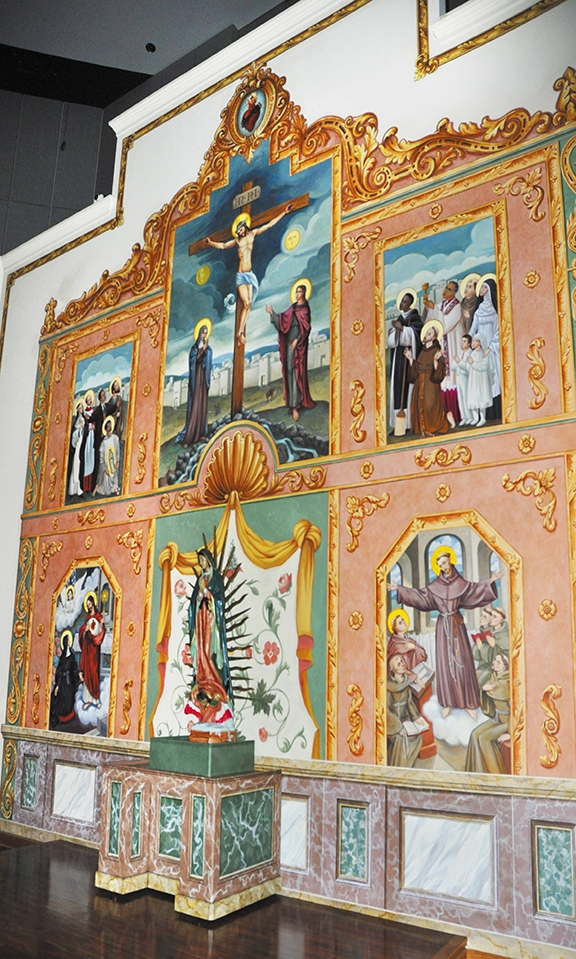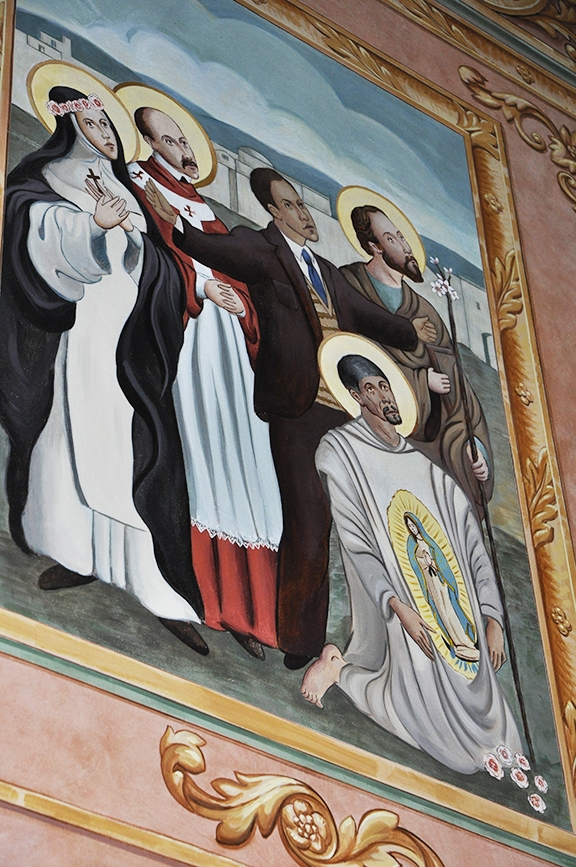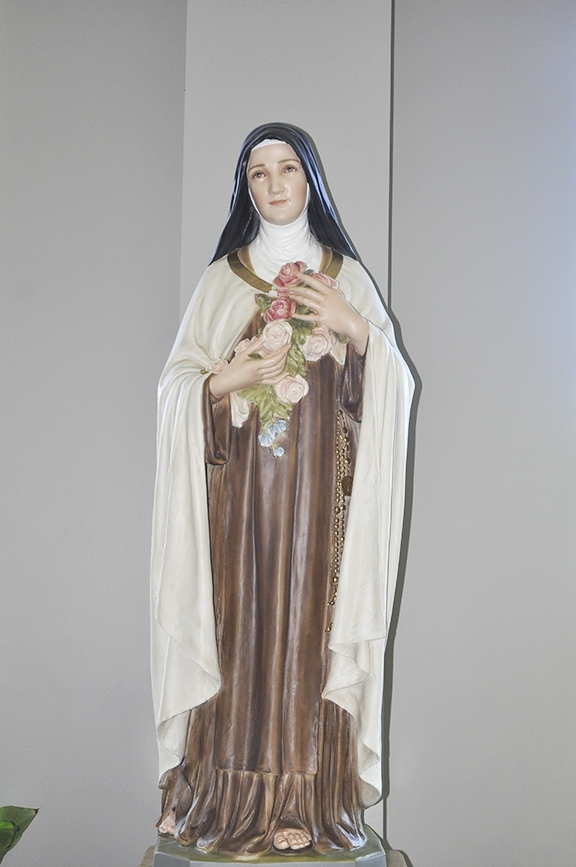
A reminder of our ultimate goal as Catholics is a running theme as the feasts of All Saints’ Day and All Souls’ Day approach Nov. 1-2.
“There is a profound connection between All Saints’ Day and All Souls’ Day, since All Saints’ celebrates the goal of the journey, the fact that heaven is attainable and many are there,” said Father John Hammond, pastor of St. Patrick Church in South Nashville and Judicial Vicar and Vicar General for the Diocese of Nashville.
“All Souls’ Day gives us a chance to focus on and pray for those who are approaching that perfect holiness but who have not yet reached it,” he said. “All Souls’ Day focuses on assisting those on their journey towards the glory and peace that are celebrated on All Saints’ Day.”
All Saints’ Day
All Saints’ Day was “formally started by Pope Boniface IV, who consecrated the Pantheon at Rome to the Virgin Mary and all the Martyrs on May 13 in 609 A.D.,” according to Catholic Online. “The holy day was eventually established on Nov. 1 by Pope Gregory III in the mid-eighth century as a day dedicated to the saints and their relics.”
It was subsequently established as a holy day of obligation.
“All Saints’ Day is one of the highest feasts of the Church’s year,” Father Hammond said. “It fulfills a double function. On the one hand, we celebrate all of the saints together; the ones that we know about like Mary, Joseph, Peter, Paul, etc.
“They have a special glory when you think about them all at once, this great heavenly host of all the saints,” he added.
“But we hope and believe that there are many saints we don’t know about,” Father Hammond continued. “There are plenty of other people who are outstanding in holiness who have not been canonized, so All Saints’ Day gives us an opportunity to celebrate them all as well.
“That’s the beauty of the feast because it captures all of that.”
Bishop J. Mark Spalding called All Saints’ Day “consoling.”
“The Feast of All Saints’ Day connects us with the Communion of Saints. We gather around the altar with all those who have gone before us who lived the faith so well in imitation of Jesus Christ,” Bishop Spalding said. “It is a great consolation that those who have gone before us in faith, hope and love have gathered with us around the altar and are interceding for us even in this present time.
“Saints are there for us and with us. They are both heroes and mentors,” he added. “We should take some time and effort to read about the lives of the saints to draw them closer to us and not allow them to become too distant.”

Because All Saints’ Day falls on Monday, this year it is not a holy day of obligation, but special Masses will still be celebrated. Check your parish website for Mass times.
All Souls’ Day
Following the high feast celebration of All Saints’ Day, the Church enters into a day of commemoration and prayer for loved ones and all the faithful departed with the feast of All Souls’ Day on Nov. 2.
“COVID really caused a number of our families to go through the grieving process without the benefit of full celebration of the sacraments,” Bishop Spalding said. “All Souls’ Day gives us another opportunity to experience the comforting and encouraging rites of the Church.”
While not a holy day of obligation like All Saints’ Day, All Souls’ Day is still a “beautiful tradition,” Father Hammond said.
“It is a day when we remember those who have passed from this life but still need our prayers,” Father Hammond said. “We don’t need to pray for the saints because they’re already in heaven, but we do need to still pray for the souls in purgatory.
“There is a pious tradition of praying for the soul in purgatory who is closest to heaven and the soul who is farthest away from heaven,” he said. “That’s a beautiful thing because your prayers might be the one thing that pushes that person over the line and gets them the rest of the way to heaven.
“If your prayers for the faithful departed are what help a particular soul get over the line, how grateful is that person going to be to you? Then you’ve got a saint who is especially indebted to you in heaven. What could be better than having a new friend in the spiritual order?”
According to Catholic Online, the belief is that a soul goes to one of three places following death: heaven, purgatory or hell.
“At the moment of your death, you go to particular judgment. That is when God judges you and determines your eternal fate,” Father Hammond explained. “That can be heaven immediately if a person is already a saint, or it could be purgatory if a person needs some additional time to get ready for heaven.
“Everybody in purgatory is going to be in heaven eventually. It is not a permanent neutral location,” he noted. “Purgatory is not a place for people who are just OK to go forever. Everybody who is in purgatory … has already been judged worthy of heaven at their particular judgment by God.”
What purgatory really means
A soul must be perfect to enter heaven, Father Hammond said.
“If I were to die right now, there are effects of my sins that, even if I’ve confessed them and been forgiven, still have affected my soul in certain ways that need to be purified,” Father Hammond said. “There can’t be anything imperfect in heaven because the very definition of heaven is where everything is perfect.
“This is one of the reasons we do penance and fast, to repair some of that damage,” he continued. “Both justice and mercy require in many cases for there to be a time for additional purification once our time on earth is done even if we’re destined for heaven.
“Purgatory basically gets us ready so that we can become the perfection of ourselves. It doesn’t mean that we become perfect in the sense that God is infinitely perfect, we just become every bit of who we are supposed to be,” Father Hammond added. “Purgatory gets us there, which is why it is actually one of the most merciful things that God ever created. Otherwise, because nothing imperfect can be in heaven, if I died right now, I’m not perfect and would have to go to hell, but God is too merciful for that.”
Why hell exists
If God is so merciful, why would a place like hell exist?
“It can be hard to reconcile that with the idea of a merciful God, but we do believe that hell exists, and you can go there if you want to, and it is very clear in Sacred Scripture,” Father Hammond said. “God won’t save you against your will because He respects our free will too much.”

According to The Catechism of the Catholic Church in paragraph 1033: “We cannot be united with God unless we freely choose to love him. But we cannot love God if we sin gravely against him, against our neighbor or against ourselves. … To die in mortal sin without repenting and accepting God’s merciful love means remaining separated from him forever by our own free choice. This state of definitive self-exclusion from communion with God and the blessed is called ‘hell.’”
Father Hammond said the very existence of hell also gives meaning to a soul choosing God.
“We believe that Christ died on the cross for a reason. His death wouldn’t be worth much if we would just go to heaven anyway,” Father Hammond said. “The Church has always been slow to say that anyone is certainly in hell … because God’s desire is for everyone to be in heaven, and you can just never know … whether there might have been some repentance that might be hidden.”
From all souls to all saints
How can someone be sure a loved one has graduated from faithfully departed to saint in heaven? Barring canonization by the Church, you can’t, which is why Father Hammond said, “it is always worthwhile to pray for our deceased loved ones.”
“No prayer is ever wasted,” he said. “Either it will benefit our loved one, which will be great, or God will use whatever grace there was and give it to somebody who needs it.”
Dia de los Muertos
Día de los Muertos or Day of the Dead celebrated among the Mexican community coincides with the celebration of All Souls’ Day on Nov. 2.
During that feast, altars are built with pictures of departed loved ones, flowers, and the favorite food of the deceased, said Father Alejandro Godinez, associate pastor of Sagrado Corazón at the Catholic Pastoral Center in Nashville.
“The tradition in Mexico is that people believe that on that day all the deceased spirits come and enjoy the food that they used to eat when they were alive,” Father Godinez said. “Also in Mexico, most of the people go to the cemetery … and clean and decorate the graves with flowers and food, and they pray the rosary.”
Symbol of eternal life for all
As both feast days approach, Father Hammond is encouraging Catholics to remember that both represent our future with God.
“All Souls’ Day will likely be our feast day for a while, and we hope people will pray for us on that day in coming years and decades and centuries, as we’re finishing up the work of getting ready for heaven,” Father Hammond concluded. “But then, when the time is right and the grace of God and the prayers of our fellow believers have healed us from all that stands in the way, then, we will be able to graduate and the Feast of All Saints will finally, gloriously, be our feast day as well.”
To find an All Saints or All Souls’ Day Mass near you, visit your parish website.









